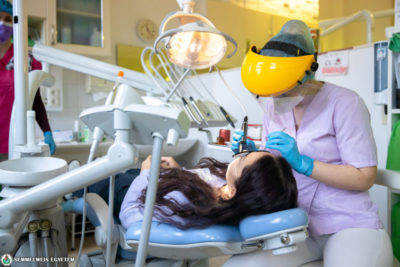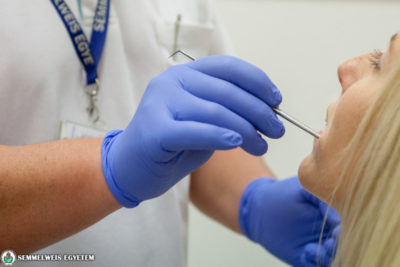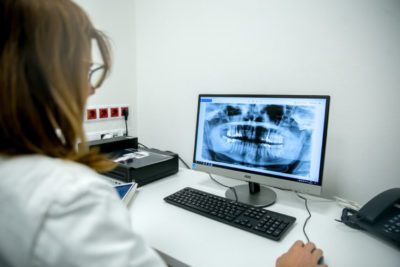The major topics of the program entitled “Old age is not a disease”, organized by the Geriatrics Clinic and Centre of Nursing Sciences on 25 February were healthy old age and the prevention as well as treatment of the most common diseases. More than 2,500 people registered for the event in advance. The Health Promotion Centre contributed to the success of the event with personalized nutrition counseling and online senior gymnastics.
What keeps one young? How does the immune system work in old age? How do we become superhero grandmothers? How may one slow down aging? Lifestyle advice for the elderly, senior gymnastics, online nutrition counseling – these were the most popular program elements on Semmelweis Health Days on 25 February, which also shows that most elderly people really aim at keeping their vitality and activity for as long as they can.
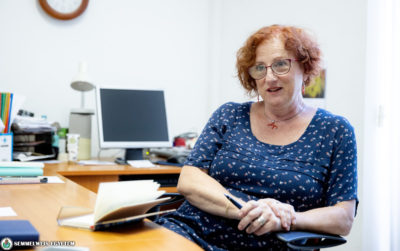 “We awaited those who were interested with eleven interesting, exciting and instructive lectures – not only for the elderly, but also for the younger age group, as healthy aging must be established earlier”, highlighted Dr. Klára Gadó, Head of the Geriatrics Clinic and Centre of Nursing Sciences.
“We awaited those who were interested with eleven interesting, exciting and instructive lectures – not only for the elderly, but also for the younger age group, as healthy aging must be established earlier”, highlighted Dr. Klára Gadó, Head of the Geriatrics Clinic and Centre of Nursing Sciences.
As she pointed out, in the treatment of the elderly, geriatricians focus not only on the patient’s organs, but also on the whole person in the framework of a holistic approach, so they can recommend personal therapy taking the existing diseases, the medications taken and their side effects into account.
However, during the series of events, the organizers also kept in mind that old age should not only be approached from the perspective of the most common diseases, so they provided a number of useful tips for prevention. However, they also focused on the most common old age problems, including cancer or thrombosis.
Personalized nutrition counseling and online senior gymnastics
Thanks to the staff of the Semmelweis Health Promotion Centre (Viktória Jób, Erika Czibere and Cintia Koltai), those who were interested had the opportunity to register in advance for individual nutrition counseling, and then use the Zoom program to take part in a personal consultation to receive answers about their lifestyle and daily eating habits.
The program was continued with online senior gymnastics, in the course of which Enikő Fanni Rácz, a certified rehabilitation specialist, presented live some useful exercises that participants can easily perform at home using the tools available in their environment.
The sports session, which was specifically tailored to the mobility needs of older people, was conducted by more than 150 people at a time in the online space, and they could also ask questions at the end of the program.
After the session, it also turned out that those interested would be happy to take part in senior gymnastics on other occasions as well, therefore the centre plans to organize similar events in the upcoming weeks. Also, a video about the event held on February 25 was posted on their Youtube channel for anyone to view later.
At Semmelweis Health Days, one of the topics was focusing on the steady increase in the proportion of older people in the population, which is why the role of geriatrics and aging strategies is gaining ground. This also contributed to the establishment of the Geriatrics Clinic and Centre of Nursing Sciences. As one lecture has pointed out, aging is actually starting in the womb, and since the average life expectancy increases almost linearly, costs related to health and social spending of the public and the self increase as life expectancy increases. The only effective solution is to significantly extend the duration of healthy and active aging. Several presentations have expressed the important idea that older people should have a purpose in life even after the years of active work: they should not view old age as a defeat, but should rather prepare consciously for active retirement, by maintaining a positive outlook on life and human relationships.
What does help keep someone young?
 Dr. Ildikó Baji, Head of the Department of Applied Psychology at the Faculty of Health Sciences, sought answers in her presentation on what keeps a person young. According to some research, in addition to genetic traits, lifestyle and thinking can add up to 30 years to the number of our lives. The specialist also listed the five factors required for young old age. So if we find joy in our daily activities, have goals, are optimistic, find our lives meaningful, and value ourselves, it can help keep us young.
Dr. Ildikó Baji, Head of the Department of Applied Psychology at the Faculty of Health Sciences, sought answers in her presentation on what keeps a person young. According to some research, in addition to genetic traits, lifestyle and thinking can add up to 30 years to the number of our lives. The specialist also listed the five factors required for young old age. So if we find joy in our daily activities, have goals, are optimistic, find our lives meaningful, and value ourselves, it can help keep us young.
Malignant tumours in old age
In his presentation, Dr. Miklós Tóth, Professor of the Department of Internal Medicine and Oncology at Semmelweis University, pointed out whether in the case of malignant tumours in old age, the question arises as to whether surgery or medication should be chosen as therapy.
“In such cases, it is always worth considering whether longer survival is associated with a better quality of life. Over the age of 85, an average person has 5-7 illnesses. For optimal treatment planning, all of the patient’s illnesses and life expectancy should also be considered. It is important that the healing is the result of the joint work of the physician and the patient, so this can only be successful if the physician is able to support and convince the patient, the person accepts the specialist’s suggestions, and the physician takes the patient’s preferences into consideration, since without the patient’s consent there is no healing”, the Professor said.
In hospital or at home?
Dr. Zoltán Balogh, Head of the Department of Nursing at the Faculty of Health Sciences, also highlighted an important question in his presentation: is the elderly, ill family member should be cared for in a hospital or at home? He presented the features and forms of the care system available to the elderly in a home environment, and also covered how to organize care with or without the involvement of family members, but how to improve the patient’s quality of life in a home environment. He mentioned a number of devices, starting from bath lift and special mattresses to patient lifting devices that help care for the bedridden elderly person, all with the advantage that the people concerned can stay in their usual environment. He also recommended devices supporting relocation and kitchen utensils to support independent living, and also introduced signal-assisted home help as an option.
The century of modern biogeronology
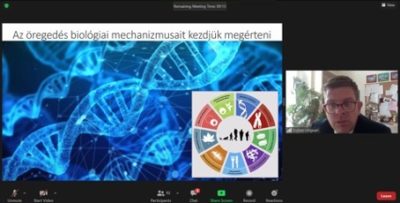 In the final lecture of the program, Dr. Zoltán Ungvári, Head of the Department of Public Health, currently a researcher in the United States, spoke about the slowness of aging and presented the latest experimental studies that reveal revolutionary new opportunities to combat age-related diseases.
In the final lecture of the program, Dr. Zoltán Ungvári, Head of the Department of Public Health, currently a researcher in the United States, spoke about the slowness of aging and presented the latest experimental studies that reveal revolutionary new opportunities to combat age-related diseases.
“The last two decades have brought great advances in research into prolonging healthy lives. To the best of our current knowledge, the biology of aging can be interfered with, and the aging process can be slowed down or reversed in experimental animals. And this is not the distant future, but the present”, the Professor said.
As an example, he mentioned that in animal experiments, reducing caloric intake has been shown to significantly increase life expectancy, and these mechanisms can be adapted to humans in the short term.
Dr. Zoltán Ungvári mentioned that the National Institute on Aging has been established in the United States with an annual budget of 3.5 billion US dollars, where they are working to understand the mechanism of aging and develop procedures to prevent disease. They are designed to extend life expectancy in health.
The Professor also talked about the Program for Healthy Aging planned at Semmelweis University, which aims to promote healthy aging and slow down the aging process.
Orsolya Dávid
Featured image (illustration): Pixabay
Photo: Attila Kovács – Semmelweis University
Translation: Katalin Illés-Romhányi
